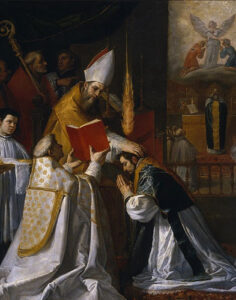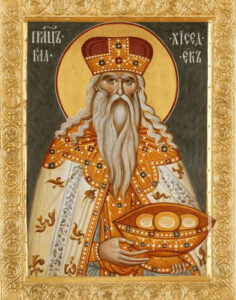Memorial of Saint Elizabeth of Hungary (Reading from Thursday of the 33rd Week of Ordinary Time) – November 17th, 2022 – Lk 19:41-44
In today’s Gospel Christ laments the fact that the Jews are blinded to what is really important: “If this day you only knew what makes for peace–but now it is hidden from your eyes.” The Greek word Christ uses for peace, εἰρήνη, eiréné, comes from the verb eiró, to join together, and so the word literally means wholeness, i.e., when all the essential parts of something are joined together. This is why Saint Augustine said that peace is “a tranquility in order”; it’s a sort of calm that comes when things are in the right place, when things are made right, and everything is where it should be. This order, this “setting things in their place,” means to be focused on Christ, who, as Isaiah says, is “the prince of peace,” or, as the prophet Micah declares: “He shall be peace.” On one hand, this certainly refers to peace among people, that is, when they are joined together without division, but it’s also no coincidence that the Greek word for anxiety, merimnai, literally means a part separated from the whole, and, figuratively, refers to how being anxious about this world divides and fractures a person into parts.
Thus, in order to establish peace, two things need to be put in order: first, my soul, and second, me in relation to others. Back in 1949, just after the Second World War, Fulton Sheen wrote, “Unless souls are saved, nothing is saved. There can be no world peace unless there is soul peace. During World War II, Pius XII said that postwar man would be more changed than the map of postwar Europe.” “There can be no world peace unless there is soul peace.” The first thing that need to be in order in the world is me, and the best way to know what needs to be put in order is to examine my conscience, sincerely, and to see what needs to be fixed. If we’re sick, the first thing we do when we go to the doctor is to tell him what’s wrong with us, otherwise he can’t treat us. Likewise, when our car starts making a funny sound, we don’t go to the shop and make up a different or a smaller problem; we just tell the mechanic the truth so he can fix it. It works the same way with our souls: in order to fix what’s wrong and obtain that peace, we need to know what the problem is, and ask for the help that we need in order to improve. Rather than saddening us, the examination of our conscience is something joyful. Fulton Sheen explains it this way: “The Christian soul knows it needs Divine Help and therefore turns to Him Who loved us even while we were yet sinners. [The] examination of conscience . . . thereby becomes an occasion of joy. There are two ways of knowing how good and loving God is. One is by never losing Him, through the preservation of innocence, and the other is by finding Him after one has lost Him. Repentance is not self-regarding, but God-regarding. It is not self-loathing, but God-loving. Christianity bids us accept ourselves as we really are, with all our faults and our failings and our sins. In all other religions, one has to be good to come to God—in Christianity one does not. Christianity might be described as a ‘come as you are’ party. It bids us stop worrying about ourselves, stop concentrating on our faults and our failings, and thrust them upon the Savior with a firm resolve of amendment. The examination of conscience never induces despair, always hope.” In particular, we can examine ourselves about two virtues: humility and trust in God. Regarding the first, Saint Thomas of Villanova wrote that “He who is humble easily obeys everyone, fears to offend anyone, is at peace with everyone, is kind with all.” Regarding the second, Saint Dorotheus wrote that “A great means to preserve continual peace and tranquility of soul is to receive everything from the hands of God, both great and small, and in whatever way it comes,” and more recently Saint Faustina reported that Christ told her that “mankind will not have peace until it turns with trust to My mercy.”
Once we have peace within ourselves because we are at peace with God, we can begin to share that peace throughout the world, starting with those nearest to us. For instance, we can think about the way we relate with those we don’t get along with. Saint Mother Teresa of Calcutta very wisely said, “If you want to make peace, you don’t talk to your friends. You talk to your enemies.” Likewise, in her 1994 address to the National Prayer Breakfast, she said, “We are reminded that Jesus came to bring the good news to the poor. He had told us what that good news is when He said: ‘My peace I leave with you, My peace I give unto you.’ He came not to give the peace of the world which is only that we don’t bother each other. He came to give the peace of heart which comes from loving – from doing good to others.” When we are at peace within ourselves because we have peace with God, we can share peace with those around us, sharing the Good News of Christ’s birth and redeeming death with everyone around us.
Today, we can ask ourselves if we are really at peace with God and with ourselves: if not, what prevents us from having that peace? Let us pray, through the intercession of Mary, Mother of God, and Saint Elizabeth of Hungary, for the grace to “strive to preserve the unity of the spirit through the bond of peace” (Ep 3:4).







